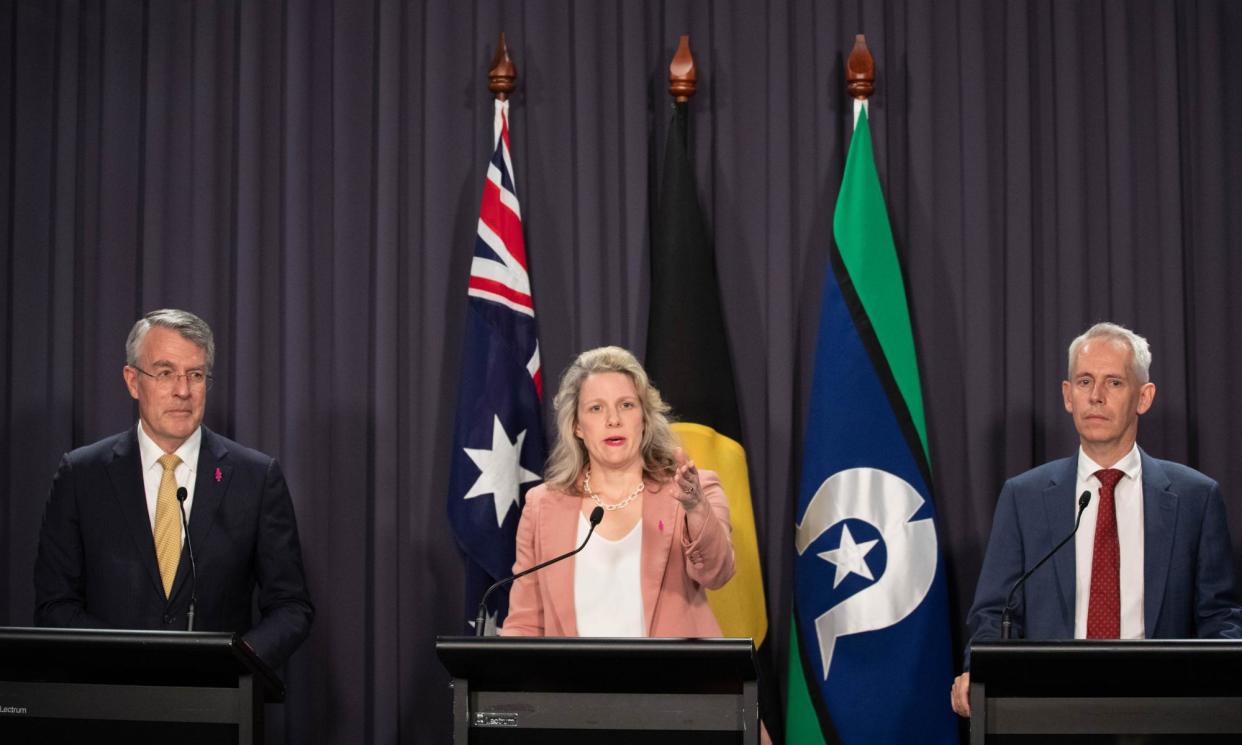Hundreds more immigration detainees could be released in sequel to NZYQ high court ruling

The Albanese government has asked the high court to rule on a major case that could extend the NZYQ ruling on indefinite detention to release hundreds more long-term detainees, including refugees and asylum seekers.
At stake is whether people in immigration detention must be released if their refusal to cooperate has prevented them being deported.
The attorney general, Mark Dreyfus, has applied to remove a federal court appeal and have it heard by the high court to settle the legal uncertainty. The commonwealth will argue for the right to continue detaining those who refuse to cooperate.
In November, the high court unanimously ruled that immigration detention is unlawful where there is “no real prospect” of it becoming practical to deport the person “in the reasonably foreseeable future”.
In that case the solicitor general, Stephen Donaghue, had warned that up to 340 people in long-term detention may have to be released as a result. So far 149 people have been released.
Many of the remainder have been kept in detention because the government’s legal advice states the NZYQ decision does not require their release if deportation is being frustrated by a lack of cooperation, such as refusing to meet government officials from their country of origin or obtaining a travel document.
The federal court has issued contradictory judgments on that point, ordering the release of Ned Kelly Emeralds on 30 November but refusing release in the case of a plaintiff known by the pseudonym ASF17.
In both cases the government argued deportation had been frustrated – in ASF17’s case because he refused to meet with Iranian authorities to get travel documents.
Related: Peter Dutton intervened to allow criminal to extend stay in Australia
According to the judgment of Justice Craig Colvin on 11 January, ASF17 submitted that he had “no obligation to cooperate and that he has good reasons for not” doing so.
ASF17 had said he “fears for his life if he is removed to Iran” because he is bisexual, Christian, a Faili Kurd and because he had opposed “the mistreatment of women by the government in Iran”.
Justice Colvin ruled that ASF17’s continued detention was lawful, refusing his application to be released.
“Where ongoing detention is to arrange removal from Australia as soon as practicable, that lawful purpose is served for so long as there is a practicable way that the person may be removed, even if it requires cooperation from the detainee for it to be achieved,” he said.
ASF17’s lawyers signalled an intention to appeal to the full federal court, prompting Dreyfus to apply on Thursday to have the matter removed to the high court for final determination.
On Thursday the Coalition targeted the immigration minister, Andrew Giles, for a fourth straight day in question time over the handling of the NZYQ court case and subsequent releases from immigration detention.
The Coalition’s attacks have been fuelled by documents tabled in Senate estimates detailing the criminal offending of those released, and the fact that seven have been charged with breach of visa conditions and 18 with breach of state or territory offences since release.
In an unsuccessful motion to suspend standing orders on Wednesday, the opposition leader Peter Dutton accused Giles of “failing to know where released detainee criminals are”.
In question time on Wednesday and Thursday, Giles said that “the location of every individual in this cohort is known” because they are “continuously monitored” through conditions including ankle bracelets or a requirement to report their address to authorities.
He cited evidence from the Australian federal police at Senate estimates that there wasn’t “any difficulty knowing where they are”.
Dutton’s motion called on “the prime minister to dismiss this incompetent minister who has proven entirely inadequate to the task of keeping Australians safe” – reiterating a demand he made in November. The motion was defeated 87 to 53.
Earlier on Wednesday the leader of the house, Tony Burke, said the Coalition’s question time tactics were designed to avoid talking about the fact the “the government is making sure that people earn more and keep more of what they earn in tax reform”.
Burke said “of course” Giles retains his and the prime minister’s confidence, describing Giles “a serious immigration lawyer looking after these issues”.
In response to the motion, the home affairs minister, Clare O’Neil, noted Dutton had lifted a bar to allow NZYQ, the original high court plaintiff, to apply for a visa and had failed to deport him.
On Thursday Dutton continued to call for Giles’ resignation over his handling of the NZYQ case.
“You need somebody who can make tough decisions and can act in our national interest and keep Australians safe,” Dutton told 2GB Radio.


